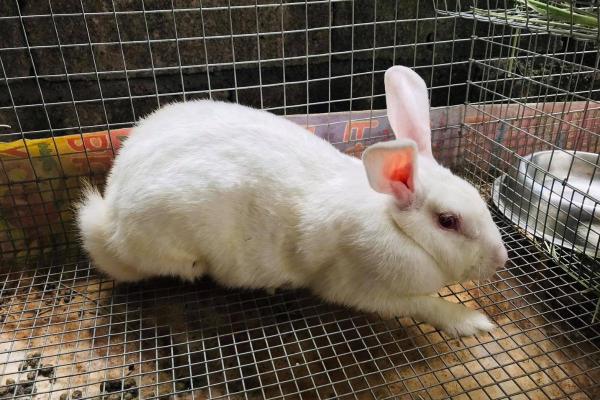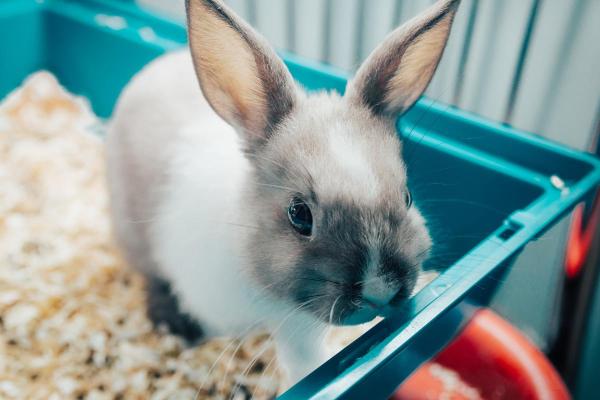My Is Rabbit Digging on the Floor



See files for Rabbits
A rabbit digging on the floor can seem like an odd behavior since there is nowhere for them to go. The reasons for this behavior are to do with their natural bunny instinct. Rabbits in the wild dig burrows to live underground, allowing them better protecting from both predators and the elements. Larger predators cannot usually access their burrow and the temperature of the underground terrain is warmer than on the exposed superior part. Domestication has allowed rabbits to better survive without the need for a burrow, but this process has not completely removed their instincts. It is also possible that digging can be a sign of a threat to their health or well-being.
AnimalWised investigates why my rabbit is digging on the floor all of a sudden. We need to look at this behavior in context in case there are any problems with need to be treated. We do so by looking at the reasons why rabbits dig.
Due to stress and health problems
When a rabbit is stressed due to physical or emotional strain, it can result in various behaviors. Some of these are stereotypies, i.e. repetitive behaviors without any obvious reason. They can be otherwise normal instinct behaviors like digging on the floor or thumping, but others can be abnormal such as when the bunny pulls out their fur to the skin. Any repetitive behavior in this way can be a stereotypy.
There are multiple potential sources of stress in rabbits. Many are environmental, with issues such as loud noise, extreme temperatures or the presence of other animals being common examples of stressors for rabbits. Sudden changes in routine can also result in stress and behaviors such as digging with no purpose.
Before we consider mental stress, we need to be aware that physical stress on the rabbit's body can result in behavioral problems as a sign of sickness in rabbits. They can be quite good at hiding physical symptoms, with physical manifestations such as the rabbit digging all of a sudden for no reason usually implying an advanced stage of disease. These can be infections, neurological disorders or even cancer, among many others.
What to do if my rabbit is stressed
The first thing we need to do if we suspect digging behavior as a sign of stress is to go to a veterinarian. They will assess the rabbit for any signs of a physical health problem and provide the correct corresponding treatment. If the problem is due to environmental stress, we need to consider the following:
- Avoid a sedentary lifestyle: good physical and mental stimulation is essential for the well-being of rabbits, while a sedentary lifestyle is one of the main risk factors for stress in rabbits. This can lead to a rabbit digging on the floor out of boredom.
- Maintain a good diet: nutritional deficiencies contribute significantly to the weakening of the immune system, favoring the development of numerous diseases, as well as affecting the behavior of a rabbit. Learn more about what a rabbit should eat with our guide to fruit and vegetables for rabbits.
- Make gradual changes in the home: whether simply moving the location of the rabbit's hutch or moving home entirely, such sudden changes can result in the rabbit digging out of frustration. Where possible, implement changes gradually and give them the opportunity to assimilate on their own schedule.
- Treat them with respect: one of the most important parts of this respect is respecting their bunny nature. Rabbits are very sensitive. They often do not like to be held, especially when a bond of trust has not yet been developed. One particular issue is when children in the home play too roughly or do not respect the bunny's boundaries. Ensure we meet them on their own terms and do not mistreat them in any way.
Now that we know why a rabbit may be stressed, it is important to know that digging for no reason is not the only sign a rabbit may be anxious. Take a look at the various signs of stress in rabbits to learn more.
They want to go outside
Rabbits are a relatively low-maintenance companion animal. They do not need to be taken for walks, nor do they need to training which dogs and other pets require. This does not mean they can be neglected.
Too many guardians think they can leave their rabbit in their hutch for their entire lives. This is very much not the case. Rabbits need to be able to run around and have a certain level of freedom. If we see the rabbit is digging in their hutch, especially at the bars, they may be trying to get out. They know the outside world is there, so they are trying to dig to access it.
What to do if my rabbit wants to go out
It is very important we allow our rabbit to access areas outside of their hutch or cage. They are still vulnerable, so we need to be careful. If we let them run around the garden they can escape and they are at risk of being attacked by cats or other animals. A rabbit run is an enclosed space which allows the bunny to run on the grass while being protected from these dangers.
We can also allow the rabbit to run inside the home, as long as they are protected from hazards such as electrical wires. Bunnies love to explore with their mouth, but this can cause damage to the animal and the home. If a rabbit digs because they want outside, let them enrich their experience and expose their senses. This will also provide exercise to avoid health problems such as stress and obesity in rabbits.

Problems with the cage
While a need for exercise and exploration can cause a rabbit to dig on the floor of their hutch, so too can problems with the hutch itself. A rabbit's cage should be suitable for their needs with size of the hutch being a very important factor. They need to be able to move adequately, have separate areas for feeding, urinating, etc., and require more space if there are other rabbits in the same hutch.
The structure of hutch itself is not the only consideration. Hygiene is very important. If we do not clean the hutch regularly, it can cause bacteria to build up and the cage to be inhospitable. They will also need a constant supply of fresh hay and accessories to stimulate them physically and mentally.
The location of the cage is also an important factor. If it is too hot or too cold, it can cause the rabbit to dig at the floor to escape. If it is somewhere with a lot of loud stimuli, it can lead to stress. We need to ensure we provide the right hutch for out rabbit, located it somewhere appropriate, clean it regularly and provide food and accessories which best ensure the well-being of the rabbit.
If you want to create the perfect space for your rabbit, discover how to build a rabbit hutch in our related guide.
Poor environmental enrichment
Even if your rabbit has a suitable cage located in the right environment, it does not mean all their needs are being met. Environmental enrichment involves providing accessories in their home which can help them express their rabbit nature freely. Not all rabbits will need the same amount of environmental enrichment as this will depend on the individual bunny. Some may require a lot of toys to keep them stimulated, others won't need many at all.
We may also need to provide accessories such as a wood block or chew toys to help keep their teeth in condition. The teeth of rabbits grow continuously throughout their lives, so gnawing and chewing allows them to keep them regulated. Not providing them with something to do this can result in the rabbit chewing on the bars of their cage to condition their teeth.
How to enrich a rabbit's environment
An easy and economical idea is to make homemade toys for your rabbit. These can include tunnels or rabbit digging boxes. Rabbit digging boxes are great if your rabbit keeps digging on the floor. It provides them somewhere to carry out their behavior in a healthier manner.
Another good practice is to educate your rabbit, since a good educational process involves promoting their cognitive abilities and stimulating continuous and progressive learning. To do this, we always recommend using positive reinforcement. Learn more with our article on whether rabbits can be potty trained.
Due to possible pregnancy
Female rabbits are more likely to dig in the cage than male rabbits. In their natural habitat, pregnant females are more active in creating a safe burrow for her to give birth. This is often in a location separate from their normal burrow to provide greater levels of privacy. If your female rabbit is sexually intact and has had recent contact with a sexually intact male rabbit, we need to consider the possibility of pregnancy.
Unlike many other animals, rabbits can be fertile at almost any time of year. This is one of the reasons why they are known for their high levels of reproduction. It can be quite difficult to tell if a rabbit is pregnant. If we suspect this is the case, we need to take them to a veterinarian to confirm the pregnancy.
What to do if a rabbit is pregnant
We recommend spaying and neutering your rabbit. Not only will this avoid unwanted pregnancy, but it will also safeguard the health of your rabbit and encourage a longer life. In addition to being an extremely reliable from of reproductive control, neutering is also the only efficient method to control or eliminate behaviors associated with sexual desire. These include escapism, marking and mounting. It also helps to prevent several diseases with high lethality in rabbits.
If you already have a pregnant rabbit in your home, it will be essential that you prepare to provide essential care during pregnancy and during the first weeks of the rabbit's life. To help you through this process, you can take a look at our extensive guide to pregnancy in rabbits.

For marking purposes
We have looked at why a rabbit is digging on the floor due to sexual behaviors in females, but there are other behaviors related to rabbits after they reach maturity. Although it may be more common in males, both male and female rabbits urinate to mark territory. This marking helps them to alert other members of their group to their presence, as well as send other messages.
Notifying others of their presence not only delimits their physical territory, but it also helps to protect resources. These resources are those that are key to the integrity and survival of their species such as food and warrens. The rabbit may even pee on you as a way to mark you as their property.
Rabbits also mark for other reasons, such as to feel safe in an unfamiliar environment. If you have recently moved with your rabbit to a new home, it is possible they feel a greater need to mark to reduce the stress of the new stimuli they experience. By digging on the floor, this can help them to feel at home.
The link between digging and marking is twofold. Firstly, rabbits will mark with urine. Before they do so, they will often dig at the ground to create a suitable place to pee. Also, the rabbit has scent glands on their chin which release pheromones. They may rub their chin with their paws and then dig with those paws to spread around their scent. These are both forms of olfactory marking that are effective forms of communication.
How to stop a rabbit from marking
This is not an easy mission since marking is an instinctive behavior in rabbits, i.e. it is part of their nature and their means of communication. Attempting to eliminate or inhibit it is highly inadvisable. Depending on the methods used, they can even be dangerous. This is why we never recommend the use of punishment or scolding. Not only will the rabbit not understand, but it can lead to behavioral problems and harm their well-being.
Similar to the previous section, neutering is the only truly efficient method to control or reduce the frequency with which marking occurs in rabbits. In addition, it can have a favorable impact on their behavior, helping them to become more docile and preventing fights from occurring with other rabbits. Such fights are often also associated with disputes over the resources present in a territory.
If you perceive that your rabbit is becoming aggressive, either with their peers or with other people and animals, it is best to go to a veterinarian. Aggressiveness in rabbits can also be related to pathological causes. If a physical disease is ruled out, they can help to assess their overall well-being and determine how we can reduce aggressive behaviors.

If you want to read similar articles to My Is Rabbit Digging on the Floor, we recommend you visit our Behavioral problems category.







